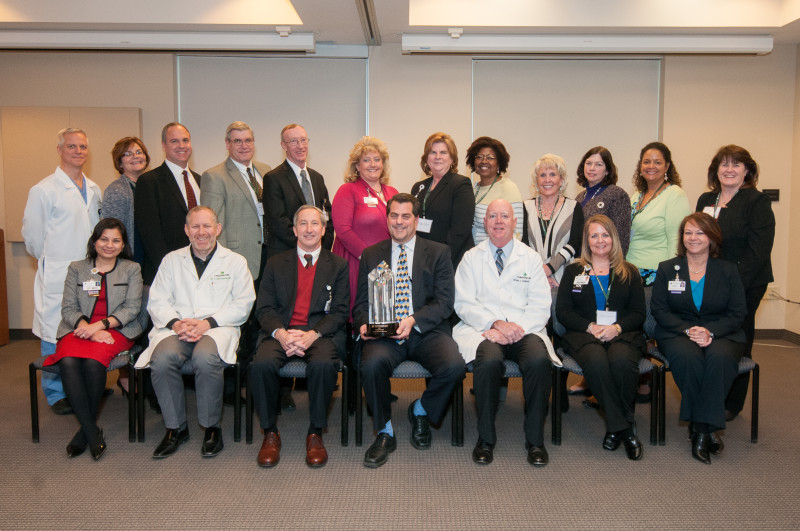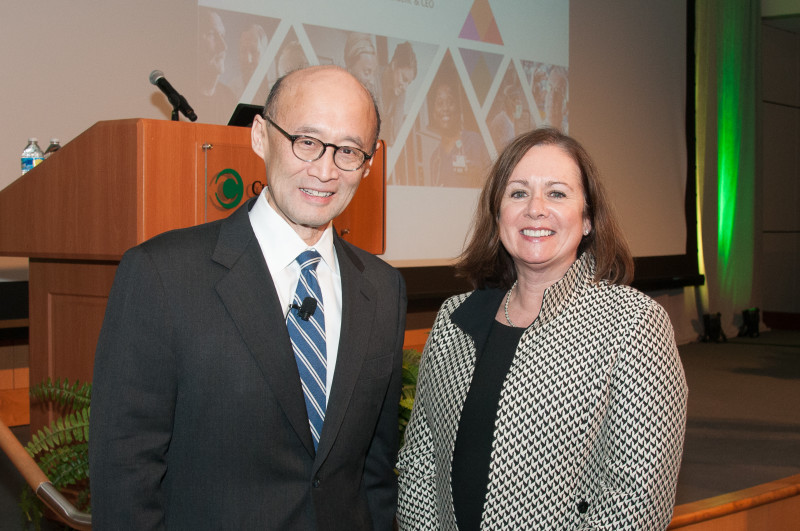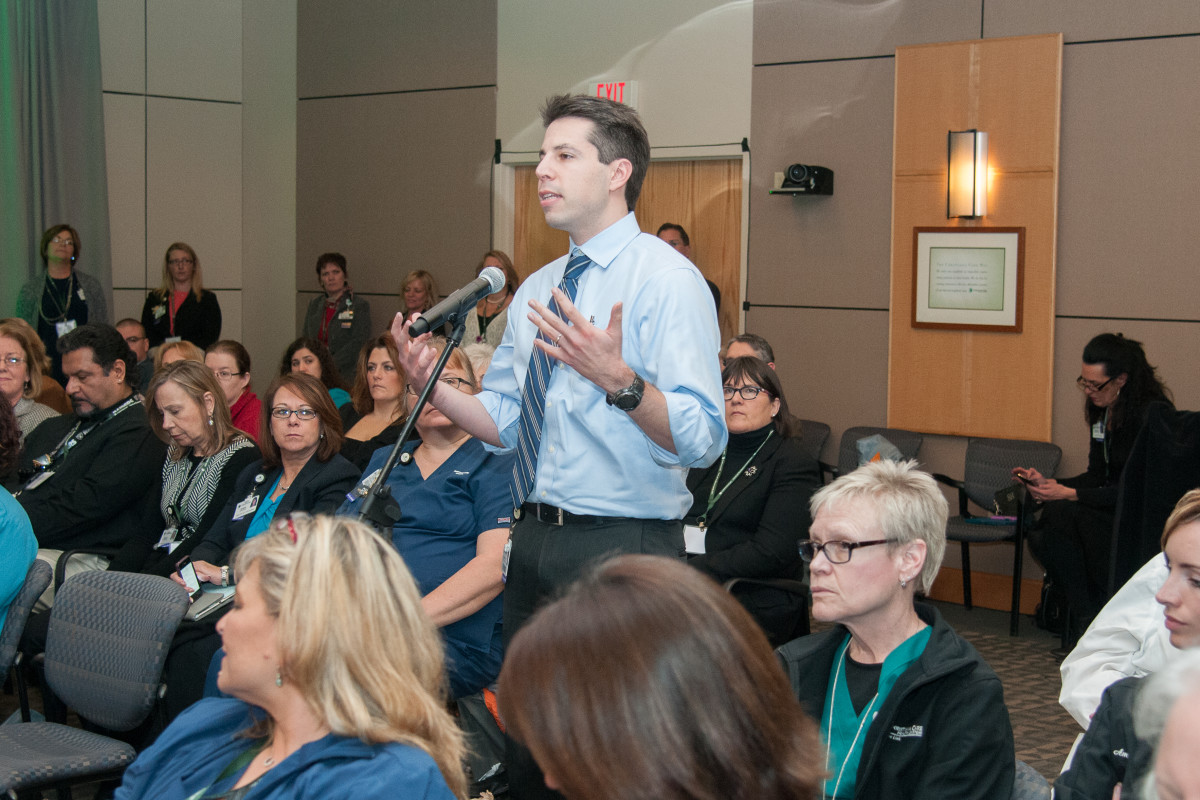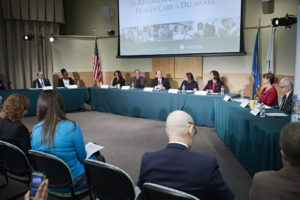Janice E. Nevin, M.D., MPH, president and chief executive officer of Christiana Care Health System, expressed deep gratitude to the many people behind the record-setting 155 Focus on Excellence Awards entries at the awards ceremony Jan. 20 at the John H. Ammon Medical Education Center.
“Your creativity and diligence are so vital to our continued success,” Dr. Nevin said. “Your sense of purpose is truly humbling and inspiring. Your work allows us to continue to adapt to the ever-changing world of health care.”
Themes for the annual celebration included gratitude, empathy and courage. Speaking to the theme of gratitude, she said, “I am deeply grateful for the great privilege of working with all of you. You folks are extraordinary people.”
Sharon Anderson, MS, BSN, RN, FACHE, chief population health officer and senior vice president, Quality, Patient Safety & Population Health Management, thanked the judges — a diverse group of more than 200 Christiana Care staff representing disciplines from throughout the organization — who devoted substantial time and thought to the task of selecting the winners. She also gave special thanks to the 58 employees whose year-round volunteer work help to make the exhibit and awards program possible.
“Today we celebrate the end of another year of Focus on Excellence competition by announcing the winning entries,” Anderson said. “Yet every project entry, whether it wins or not, represents Christiana Care’s staff’s commitment to drive improved performance in all that we do in support of The Christiana Care Way. The quantity and diversity of the submissions have always been reflective of Christiana Care’s innovation and teamwork to better serve our patients, families and community.”
All 155 projects were displayed during a two-week exhibition in October, and winning projects were displayed again in the Education Center on Jan. 20. All entries, in PowerPoint, plus a comprehensive book of abstracts in PDF format, are now available for viewing by Christiana Care employees on the Center for Quality & Patient Safety/Service Lines intranet site.
The quantity and diversity of the submissions have always been reflective of Christiana Care’s innovation and teamwork to better serve our patients, families and community. Teams are encouraged to identify an opportunity for improvement, then develop and carry out a plan to achieve improvements in process or outcomes using the Plan-Do-Check-Act or Lean Six Sigma DMAIC model. Teams create a storyboard that explains the project, and all of the storyboards are displayed in an exhibit in October, in conjunction with National Healthcare Quality Week.

This year, the President’s Award, presented by Dr. Nevin, is titled “Bundling Care to Create Value.”
Christiana Care began the journey from volume- to value-based payment, in alignment with long-term strategic goals, by implementing two bundles under Medicare’s Bundled Payments for Care Improvement (BPCI) initiative.
BPCI is an innovative new payment model that combines reimbursement for defined episodes of care, along with financial and quality accountability. Christiana Care is participating in Model 2 of the BPCI program, which defines an episode of care as the acute care hospital stay and all services provided to patients for 90 days after discharge. Two “bundles” were implemented in January 2015: total joint replacement and cervical spine surgeries.
Clinicians and key stakeholders redesigned clinical care and developed a longitudinal care-management infrastructure. Care Link’s team of nurses, case managers, social workers, pharmacists and physicians is leveraged to provide comprehensive care from pre-surgery through 90 days after hospital discharge. To reduce supply expenses related to joint and spine implant costs, formulary pricing contracts were established with vendors.
The team also collaborated with post-acute-care services, including Christiana Care’s VNA and skilled nursing facilities, to redesign care and improve patient experience. A third bundle, cardiac valve surgery, was added in April 2015.
In the first eight months, the Care Link team served more than 1,040 Medicare joint replacement and cervical spine patients. Patients discharged to the community (home or home health services) increased by 9 percent for the three populations combined and discharges to skilled nursing facilities decreased by 7.5 percent.
In addition to increasing patient satisfaction, these results reduced Medicare expenditures in the 90-day post-discharge period. Thirty-day and 90-day readmission rates decreased by about 26 percent overall. Internal financial analyses show savings of $850,000 for joint replacement and cervical spine procedures in the first six months.
The successful methodology was expanded to four more bundle populations in 2015: lumbar spine and coronary artery bypass surgery in July, and heart failure and stroke in September.

Press Ganey CMO Thomas H. Lee, M.D., discusses importance of empathy in health care
At the awards ceremony, guest speaker Thomas H. Lee, M.D., chief medical officer of Press Ganey, shared insights from his book “An Epidemic of Empathy in Healthcare: How to Deliver Compassionate, Connected Patient Care That Creates a Competitive Advantage.”
A practicing internist and cardiologist at Brigham and Women’s Hospital in Boston, leader in provider organizations, researcher and health policy expert, as Press Ganey CMO he is responsible for developing clinical and operational strategies to help providers across the nation measure and improve the patient experience, with an overarching goal of reducing the suffering of patients as they undergo care and improving the value of that care.
At a time when consumers are increasingly engaged in their health care decisions and providers are being called upon to deliver even greater value, an “epidemic of empathy” in health care presents a clear path to patient-centered care and a valuable resource to reduce patient suffering and improve the patient experience, Dr. Lee said.



